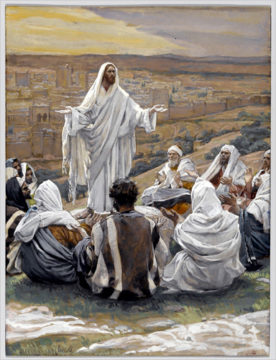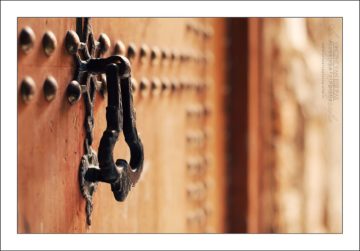Franciscan Friar Fr. Paul Gallagher reflects on the Gospel for the Seventeenth Sunday of Ordinary Time, July 24, 2022. The content is edited by Franciscan Sister of Christian Charity Sister Anne Marie Lom and Joe Thiel. The excerpts from the Sunday readings are prepared by Joe Thiel. To read or download the complete pdf with excerpts for your prayer, please click here: Franciscan Gospel Reflection July 24 2022. Excerpts are from the Lectionary for Mass for Use in the Dioceses of the United States of America, second typical edition © 2001, 1998, 1997, 1986, 1970 Confraternity of Christian Doctrine, Inc., Washington, DC. Used with permission. All rights reserved. No portion of this text may be reproduced by any means without permission in writing from the copyright owner. Photo: Brooklyn Museum, Public domain, via Wikimedia Commons; Vincent_AF from Rotterdam, Netherlands, CC BY-SA 2.0 <https://creativecommons.org/licenses/by-sa/2.0>, via Wikimedia Commons
Luke 11:1-13
Jesus was praying in a certain place, and when he had finished, one of his disciples said to him, “Lord, teach us to pray just as John taught his disciples.” He said to them, “when you pray, say:
Father, hallowed be your name,
your kingdom come.
Give us each day our daily bread
and forgive us our sins.
for we ourselves forgive everyone in debt to us,
and do not subject us to the final test.”
And he said to them, “Suppose one of you has a friend to whom he goes at midnight and says, ‘Friend, lend me three loaves of bread, for a friend of mine has arrived at my house from a journey and I have nothing to offer him.’ And he says in reply from within, ‘Do not bother me; the door has already been locked and my children and I are already in bed. I cannot get up to give you anything.’ I tell you, if he does not get up to give the visitor the loaves because of their friendship, he will get up to give him whatever he needs because of his persistence.
“And I tell you, ask and you will receive; seek and you will find; knock and the door will be opened to you. For everyone who asks, receives; and the one who seeks, finds; and to the one who knocks, the door will be opened. What father among you would hand his son a snake when he asks for a fish? Or hand him a scorpion when he asks for an egg? “If you then, who are wicked, know how to give good gifts to your children, how much more will the Father in heaven give the Holy Spirit to those who ask him?”
Background:
The gospel for last week portrayed Mary as a good disciple, sitting at the feet of her master. This was despite Martha’s concern that her sister Mary had left her alone to do the typical tasks assigned to women in extending hospitality. Instead of responding sympathetically to Martha, Jesus’ supported Mary’s decision to take the role of disciple.
In Luke’s gospel, the text for this week’s gospel follows immediately.
Luke often describes Jesus as a person of prayer.
- Luke 3:21 Jesus prays after his baptism
- Luke 6:12 Jesus prays before sending out the twelve
- Luke 9:18 Jesus prays before asking his disciples who people think he is
- Luke 9:29 Jesus prays on the mountain at the Transfiguration
- Luke 11:1 (today’s text)
- Luke 22:39-46 Jesus prays before his arrest, trial, beating, and death
 In prayer, Jesus finds the strength and guidance he needs to face those especially challenging points in his life. In today’s text, the disciples ask Jesus to teach them to pray as John has taught his disciples. At least in part they are asking for a prayer form that will identify them as disciples of Jesus and have influence with God as Jesus himself seemed to have influence.
In prayer, Jesus finds the strength and guidance he needs to face those especially challenging points in his life. In today’s text, the disciples ask Jesus to teach them to pray as John has taught his disciples. At least in part they are asking for a prayer form that will identify them as disciples of Jesus and have influence with God as Jesus himself seemed to have influence.
It was common for a religious leader to teach their disciples to pray. The text indicates that seeing Jesus at prayer prompted the disciples’ request. There is some discussion among biblical scholars whether what Jesus taught was an actual prayer or a formula to be used in their prayer. Tradition indicates that it has been understood as a prayer; but to see it as a formula for praying could also be part of what Jesus intended.
The prayer itself has an unmistakable communal aspect; all the pronouns are plural. It has three movements: invoking God, glorifying God, and finally petitioning God.
The term “Father” suggests a relationship that is both intimate and childlike. The prayer invites us into relationship with God through Jesus and asks that God be given the honor that is due, and for the coming reign of God, to the end time when the fullness of God’s plan will be manifest. The prayer for daily bread assumes continuous giving by God and a constant dependence on God. The petition that God be forgiving carries with it the understanding that those asking are, themselves, forgiving of others. Lastly, the prayer asks that we not be overwhelmed by temptation.
Following the instruction itself, Jesus uses a parable to instruct the disciples that they should be persistent in their prayer. In the parable, the friend responds because of his neighbor’s persistence, not because it was the right thing to do or because he will face public embarrassment if he does not assist. Finally, Jesus instructs the disciples that God knows how to give good things to those who ask, but they must ask.
Most people to whom Jesus preached were peasants and those who had very little control over their own lives. Governments, religious institutions, and the few wealthy of the day made most decisions for people. Developments in science, medicine, and technology have given many the ability to make choices around their life, and a sense of control not experienced previously. At the same time the recovery community has helped many understand those areas of their life that were out of control. Both types of experience have shaped both our need for prayer and our understanding of our need for a relationship with God.
Reflection Questions:
- My best times for praying are…
- Some of the things that make it difficult for me to pray are…
- I think the times I felt closest to God this week were…
- Who are the people who have taught you the most how to pray?
- Can you think of a time you needed someone to pray with you?
- Why do you think the Our Father is part of every Mass, and often used as part of public prayer services? Is it meaningful for you?
- If you reflect on your personal prayer through the lens of the Our Father, what insights do you find?
- In today’s gospel Jesus asks the disciples, “What father among you…?” How does this influence your understanding of the experience of God being a father to you?
- If you are able, take some time to talk to God about your prayer. What do you like about your prayer? Do you think God is pleased when you come to him in prayer? Is there a question you would like to ask God? Is there a desire in you like that of that of the disciples in the Gospel, that God teach you how to pray? Talk to God freely about your prayer in whatever thoughts, hopes, or questions that you might have.


